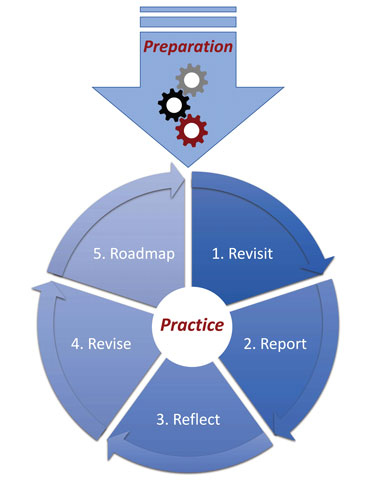PLO Assessment
All academic programs are expected to regularly engage in assessment of program learning outcomes (PLOs). PLO assessment offers faculty a consistent opportunity to reflect on and discuss student learning in order to improve program curriculum and pedagogy. The PLO Assessment Report serves as a record for current and future faculty of student learning outcomes achievement, assessment practice and program improvements. Below is an overview of the PLO assessment process; for more details, see our .
The is due on or before June 30th each year.
Preparation
The preparation phase, which occurs when a new program is developed or an existing program is heavily revised, sets up an academic program for assessment success. It involves clarifying what, which, when, how and who:
- What will students be expected to know, feel or do as a result of completing your program?
- Which student work will best demonstrate that they have achieved the learning outcomes? In other words, what specific criteria will demonstrate that students have learned what you have taught them?
- When and how will you gather evidence of student learning as a way of offering program-level feedback?
- Who will be responsible for leading regular program-level assessment in your department? For gathering the evidence of student learning? For evaluating it?
These preparatory questions are expected to be adequately addressed, and accompanying materials prepared, by those developing proposals for curriculum committees (UCC or GCC) or the Review of Academic Programs (RAP) committee.
Practice
The five steps outlined below mirror the five sections of the PLO Assessment Report. Taken together, they comprise the regular practice of learning outcomes assessment at Biola.
1. Revisit
If an academic program has been in existence for more than one year, its faculty will begin by revisiting any changes that were made as a result of last yearŌĆÖs PLO assessment (cf. step 4, ŌĆ£ReviseŌĆØ). This section asks, ŌĆ£What changes were made?ŌĆØ and ŌĆ£How were they implemented?ŌĆØ
2. Report
Reporting is the most robust step in the process. Here, student evidence is gathered as planned (cf. Assessment Plan) and evaluated according to pre-established guidelines (e.g., PLO Rubric) and results on student achievement of learning outcomes are then reported. In order to facilitate efficient and consistent evaluation of student work, it is advised that your department conducts a rubric norming session as a part of a PLO assessment gathering. After student work is evaluated, results should be communicated to all department faculty in preparation for step 3.
3. Reflect
After results have been compiled and shared with all faculty in the department, it is time to reflect on what the results mean for practice. Key questions to ask include,
- What does the data tell us about studentsŌĆÖ attainment of the learning outcome?
- What went well?
- What can be improved?
4. Revise
The goal of assessment is evidence-based improvement. As a result of your departmentŌĆÖs reflective discussion, it may be clear that one or more changes need to be made. Changes may be related to curriculum (revise the PLO or course content, offer certain courses more frequently, revise prerequisites or the course sequence, add or remove a course), resources (re-assign or train faculty or staff, increase classroom space), process (revise admission criteria or advising standards, improve use of technology), or assessment (modify our expectations, revise data collection methods or measurement approaches, collect and analyze additional data).
Certain changes will require that you notify the University (e.g., revising PLOs, Assessment Plans or Curriculum Maps). Curricular changes, such as revision of a PLO, requires curriculum committee approval. Changes to an Assessment Plan or Curriculum Map should be brought to the attention of the Office of Educational Effectiveness through the .
5. Roadmap
The final step in the PLO Assessment process is to look ahead. Consult your departmentŌĆÖs Assessment Plan to address the following questions:
- Which PLO will your department be assessing next?
- What assignments need to be collected?
- From which courses and academic term(s)?
- Who will be tasked with gathering this evidence? With leading the assessment process?
If your departmentŌĆÖs Assessment Plan and course offerings do not naturally align, adjustments or accommodations must be made to ensure that data on student learning may still be collected and analyzed. By giving thought to next yearŌĆÖs assessment, you enable your department to proactively adapt its assessment practice.
If you have any questions, please contact Eileen Soto, Director of Educational Effectiveness.
Assessment Cycle

